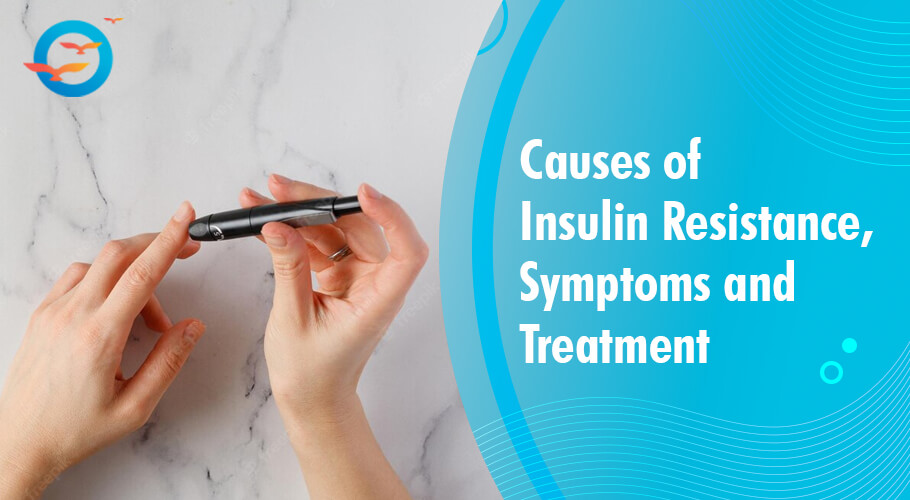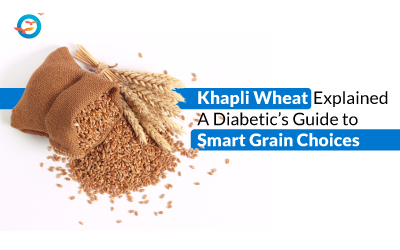Causes of Insulin Resistance, Symptoms and Treatment

Oftentimes, for reasons we shall see later in this article, the body is unable to respond to the insulin produced in its own pancreas. Now, insulin’s major function is to open the muscle cells in order to allow glucose into the cells. When the cells do not respond to the insulin produced in the body, glucose from the blood cannot enter the cells and blood glucose levels rise. In this article, we take a look at the reasons for this resistance, symptoms, treatment, and prevention.
Understanding insulin resistance (impaired insulin sensitivity)
In a healthy body, food that is consumed is broken down into glucose, which enters the bloodstream, signaling the pancreas to secrete insulin. The insulin acts like a key opening up the cells to allow glucose to enter the cells. Glucose is essential for the creation of energy, however, when cells in the muscles, liver and other tissues do not respond to insulin, the glucose in the blood is unable to enter the cells and this leads to a build-up of glucose in the blood. If left untreated, this progresses to diabetes and brings a host of complications from heart damage to kidney failure.
There are many reasons why muscle, fat, and liver cells stop responding or respond inappropriately to insulin. This means they cannot take in glucose or store it. This is described as insulin resistance. When this happens, the pancreas responds by producing more insulin to try to overcome the rising blood glucose levels.
This condition is known as hyperinsulinemia. If the pancreas is able to produce sufficient insulin to overcome the cells’ weak response to insulin, blood sugar levels will remain in the normal range. However, if the cells become resistant to insulin, it will lead to elevated blood glucose levels—known as hyperglycemia—over time, which will result in pre-diabetes and eventually Type 2 Diabetes (T2D).
Thus diabetes is not a disease in itself but the body’s response to insulin insensitivity. Other than T2D, insulin resistance is responsible for other conditions, including obesity, heart disease, and Polycystic Ovary Syndrome.
Thus, all diabetics are insulin resistant, but the reverse isn’t true. You need not have diabetes to be insulin resistant. In fact, there are times when insulin resistance can be temporary—if using steroid medication, for instance—or it can be chronic.
The two key factors that would seem to trigger insulin resistance are excessive fat, especially belly fat, and insufficient exercise.
While there is a genetic component, this is more like a switch that can remain permanently in the “off” position or turn on through bad lifestyle choices—mainly diet-exercise-stress.
It is believed that excess body fat—belly fat, and insufficient physical activity are the two main causes of insulin resistance.
- Excess body fat:
As fat collects in your midsection, known as visceral fat, and spreads to cover organs like the pancreas, liver and kidney, it begins to compromise their functionality, leading to insulin resistance. In addition, this belly fat contributes to inflammation in the body, which is another cause of insulin resistance. A general rule of thumb is that your waist measurement should not exceed half your height. So if you’re 170 cm tall, a waist measurement of 85 cm is your outer threshold.
- Physical inactivity:
When you exercise or participate in physical activity your muscles absorb glucose and use it to create energy. Thus, lack of physical activity has the opposite effect, i.e. leading to a build-up of glucose in the blood and weight gain, which leads to insulin resistance.
- Diet:
What you eat has a direct effect on your blood sugar—and thus, insulin resistance. Simple carbs, highly processed foods, and foods containing saturated fats are high-risk factors for insulin resistance. When you eat carb-rich foods—especially simple carbs--your body quickly digests the carbs, converting them into sugar, which it sends to the bloodstream, causing your blood sugar to spike. This forces the pancreas to produce extra insulin, which, as we have seen, eventually leads to insulin resistance.
- Some medications:
It has been seen that some medicines also lead to insulin resistance, for instance, steroids, some immunosuppressant drugs, like those used to treat HIV, some blood pressure medications, and certain psychiatric medications.
- Hormonal disorders:
Problems with some hormones can also lead to insulin resistance. For instance: Cushing’s Syndrome—a condition characterized by excessive cortisol in the body; hypothyroidism—sluggish or inactive thyroid, which leads to a slow metabolism, and thus, weight gain and insulin resistance; congenital disorders or inherited disorders, like muscular dystrophy that affects the endocrine system; lipodystrophy—inability of the body to use or store fat properly; and Werner syndrome—characterized by progressive diabetes, among others.
As the body becomes resistant to insulin, the pancreas production switches into overdrive, but the increase in insulin—known as hyperinsulinemia—brings its own negative effects. Excess insulin leads to weight gain, which in turn aggravates insulin resistance. Hyperinsulinemia is also linked to higher levels of triglycerides, atherosclerosis (hardening of arteries), and hypertension (High BP)
Symptoms of insulin resistance
As long as the pancreas is able to increase insulin production sufficiently to keep your blood sugar levels in the normal range, symptoms will usually not be visible. However, in time, as the insulin-producing beta cells in your pancreas get worn out it will lead to elevated blood sugar (hyperglycemia), and one or more of the following symptoms will be seen.
- Increased thirst & hunger
- Frequent urination
- Blurry vision
- Headaches
- Slow-healing wounds
Some pre-diabetes too show symptoms, such as:
- Acanthosis Nigricans—darkening of the skin at the back of your neck, armpits, and around the groin.
- Vision problems, such as spots, blurred vision, and diminished peripheral vision.
- Pins and needles.
- Skin tags
If you notice any of these symptoms, please see your doctor immediately
Treating Insulin Resistance, Holistically
While traditional medicine focuses on bringing down blood glucose, this doesn’t address the root cause of insulin sensitivity; and in most cases, leads to a progressive worsening.
The truth is that, barring some cases, insulin resistance can be more than managed; it can be reversed completely. At Freedom From Diabetes (FFD), we have had tremendous success with our reversal programs through our four protocols, which focus on the four primary triggers for insulin resistance, viz: diet-exercise-stress management-medical.
Eating a healthy diet, which means replacing simple carbs, high GI foods (foods ranking above 70 on the Glycemic Index), animal dairy and dairy products with healthy veggies, fiber-rich beans & legumes, and foods rich in micronutrients, ensures the body gets sufficient nutrients, vitamins, and a healthy gut.
Regular medium-intensity exercise improves glucose energy usage and muscle insulin sensitivity. Ideally, you should aim to get about an hour each day, with a mix of cardio activity, muscle building resistance training, and flexibility and balance improving movements.
Stress too plays a major role in triggering insulin resistance. When you’re stressed, your body releases cortisol, which triggers glucose release into the blood stream. This excess glucose is eventually stored as fat. Stress is also a primary cause of inflammation in the body. Dissipating stress is a natural way to relieving inflammation and improving insulin sensitivity. In addition to meditation and breathing techniques, we also teach some unique ways to release stress.
Medical supervision is another key pillar in our reversal programs. The effect of changes in diet, the introduction of physical fitness regimes, and stress management need to be factored into drug prescription to avoid potentially life-threatening problems such as hypoglycemia, this is why we monitor our program participants’ biomarkers on a 24x7 basis and dedicate a full team of doctor-diet expert-exercise expert-stress management expert to each participant in our program. The results speak for themselves. FFD has to date helped more than 12,000 people free themselves completely of all diabetes medicines, and go on to live happy and fulfilling lives.
For more information about our reversal programs, visit www.freedomfromdiabetes.org or our Facebook/Instagram and Youtube channels

